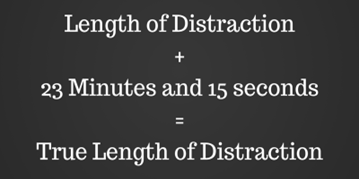How many times are you distracted during a workday? Now take that number and multiply it by 25. That’s how many minutes of concentration you’re losing. It takes an average of about 25 to return to the original task after an interruption. Distractions don’t just eat up time during the distraction, they derail your mental progress for up to a half hour afterward.
Staying focused, the non-Mozart way
Start by setting aside uninterrupted blocks of time for focusing. Work on one masterpiece at a time. Even brilliant people need uninterrupted focus to do great work. Granted, times have changed since Mozart’s era. Back then, you almost had to schedule in time for distractions. “I’ll work all day and check the day’s mail at 3 p.m.,” the thinking went.
If you got in the zone on your work, you might just work all day and forget to check the mail. Today’s problem is the opposite: If you don’t plan on getting in the zone, you’ll check your mail all day and forget to work. Some companies use the “Think Time” strategy. They block certain hours in a week for “think time” During this time, employees aren’t expected to respond to emails or distractions that aren’t urgent.
It’s worth knowing the true cost of distractions. Try to fight it by planning time for distraction-free thinking and working. Let the people in your life and organization know what this time is for. Encourage them to do the same. You’ll get more important things done. You might not become the next Mozart.
- Blake Thorne













